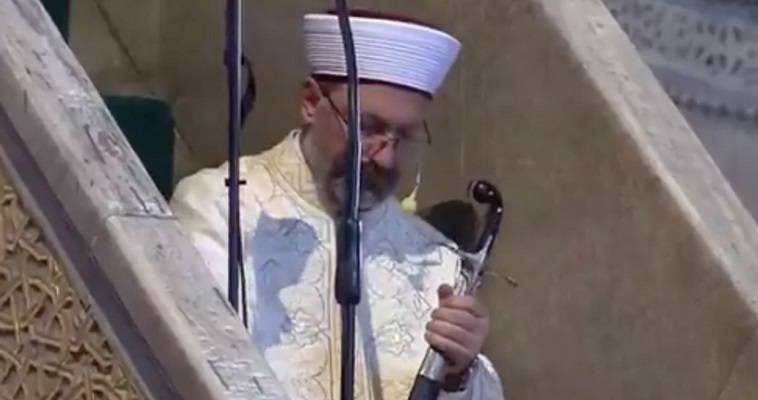Stavros Lygeros: Erdogan’s Neo-Ottoman Revolution – Why the West has lost Turkey
25/07/2020
Some described the conversion of Hagia Sophia into a mosque as the coup de grace against Kemalism. That it is, but it’s not just that. It signifies something wider. After 18 years in power, Erdogan has radically changed Turkey. In this sense, it is a real revolution, even if the way it was done differs qualitatively from the classic revolutions of the 20th century.
But how can the ideological perspective and personal political interest of a leader bring about such a major shift in a country’s geopolitical orientation? After decades of attachment to the West, which have shaped perceptions, influences and interests, why was there no strong resistance from the traditional ruling elites there?
The question is crucial and to answer it two factors must be taken into account. The first is the traditional relationship of the Turkish economic elite with political power, combined with the stunted “civil society” in Turkey. The second has to do with the tectonic changes that have taken place since 2002, when the Justice and Development Party won elections and formed a government.
The business class
Both in the Ottoman Empire and later in the Turkish Republic, thriving enterprises had little political influence compared to the West. In both periods, political power had the upper hand because it controlled the state. In the Ottoman period it was the sultan, who institutionally had absolute power over his subjects, regardless of the wealth they possessed.
After the proclamation of the Republic in 1923, political power was held – in the context of an authoritarian regime characterized by intense statehood – by the Kemalist military group that led the war and the establishment of the nation-state, which succeeded the empire. Entrepreneurs of the time did not have the opportunity to claim a share of influence. They were, after all, relatively weak. This did not change much after the war, when, in order to adapt to Western standards, Turkey adopted a multi-party system.
Gradually, large business groups, with a significant economic and social footprint, developed within Turkey. In their dealings with the political elite, however, they never managed to get the upper hand. That has not changed in the years that the Justice and Development Party has ruled. Much more so when Erdogan set up his own regime. In fact, he made sure to spectacularly exterminate a big businessman/media mogul who had stood against him.
Erdogan is the “favorite child” of the West
Initially, Erdogan was the “favorite child” of the West. He gradually became a problem when he began to unfold his own agenda for the role of Turkey. At the time, it seemed that he did not want it to be the ultimate link in the Western security system, nor a “bridge” of the West to the Muslim world, as the Obama administration and the European capitals imagined. It was then that it became apparent that Erdogan wanted Turkey as an autonomous regional power that would play its own game.
Erdogan has unfolded his agenda since 2012, after his final victory in the ten-year informal war with the post-Kemal “deep state”. When the Americans realized this tendency for geostrategic autonomy, they sent him a threatening message through a corruption investigation within the mechanisms of the Turkish state carried out by the Gulen network, which they controlled.
But instead of rushing to bow down and adjust, Erdogan declared war and began dismantling the Gulen network, indirectly but clearly against American and European influence in Turkey. Thus we reached the failed coup of 2016, which gave the legal basis for mass purges throughout the range of state mechanisms and beyond.
In order to dismantle American networks of influence, Erdogan played the card of US involvement, not only in the plot of the Gulen conspiracy, but also in the narrative that the West is manipulating the mutilation of Turkey, which has deep historical roots in Turkish society. He cultivated this narrative, citing US support for the Kurds in Syria as proof that the creation of a Kurdish state is under way.
Erdogan’s power structure
The additional result of all this, and especially of the failed coup, was that Turkey was led to a second regime change. The first was the ten-year transition from the post-Kemalist to the neo-Ottoman regime. The second was the transformation of the neo-Ottoman regime into a regime dominated by Erdogan’s personality and surrounded by Turkish anti-Western forces.
The post-Kemalist regime was collectively dominated by a political elite, framed by an economic-social elite. In the neo-Ottoman scheme, Erdogan was the leader, but he informally co-ruled with a leading group that included the Gulen network. Today the ruling Justice and Development Party is very different from what it was 10-15 years ago.
Leaders, such as e.g. Gul, Babacan and Davutoglu have been marginalized and have turned against Erdogan, believing it is not unreasonable that a move away from the West would have a negative effect on Turkey. This concern is shared by many in the country’s traditional ruling elites, but they are powerless to influence things, fearing that they will be accused of being part of a Gulenist “conspiracy”.
Erdogan, then, has gone from being the leader of a current to an informal monarch, an elected neo-sultan. It is indicative that as a rule he is surrounded not by the old guard of his party executives, but by relatives and obsequious vassals, as well as by executives of the traditional “deep state”, who are bearers of anti-Western ideology.
Turkey is lost to the West
This practically means that Turkish national interests are not defined and understood collectively by a ruling elite, but by the neo-sultan and his court. In other words, Erdogan’s personal interest is Turkey’s national interest. He is convinced that if he returns to the western “fold” he will be taken hostage. The American networks of influence will be reconstituted and will most likely be used to replace him.
In this way, he has added a broader ideological and political dimension to the current rift, which is barely papered over by his peculiar and, for many, politically inexplicable relationship with President Trump. The contrast is no longer between the American “deep state” and Erdogan. It is not just political. It is cultural at the same time. It is between the West and “deep Turkey”, even if the West has not realized it.
This was clear in the case of Hagia Sophia. The conversion of the historical monument into a mosque and the whole ceremony of the first Muslim prayer with a sword bearing imam, a reference to a symbolic revival of religious wars: on the one hand Islam and on the other the Christian West. Erdogan’s neo-Ottomanism, as an ideology and political movement, is not only intended to close the historical parenthesis of Kemalism and reconnect Turkey with its Ottoman past. It also carries with it the ambition to turn Turkey into the leader of the Muslim world in an unspoken but clear anti-Western direction.
So the economic crisis may have tarnished Erdogan’s image, but his ideological narrative continues to move “deep Turkey”. And that will not change radically even if the political deterioration of the Turkish president intensifies. In fact, Turkey, at least as long as Erdogan is at the helm, is already lost to the West. And it has been lost not only politically, but more deeply, on the cultural level.





